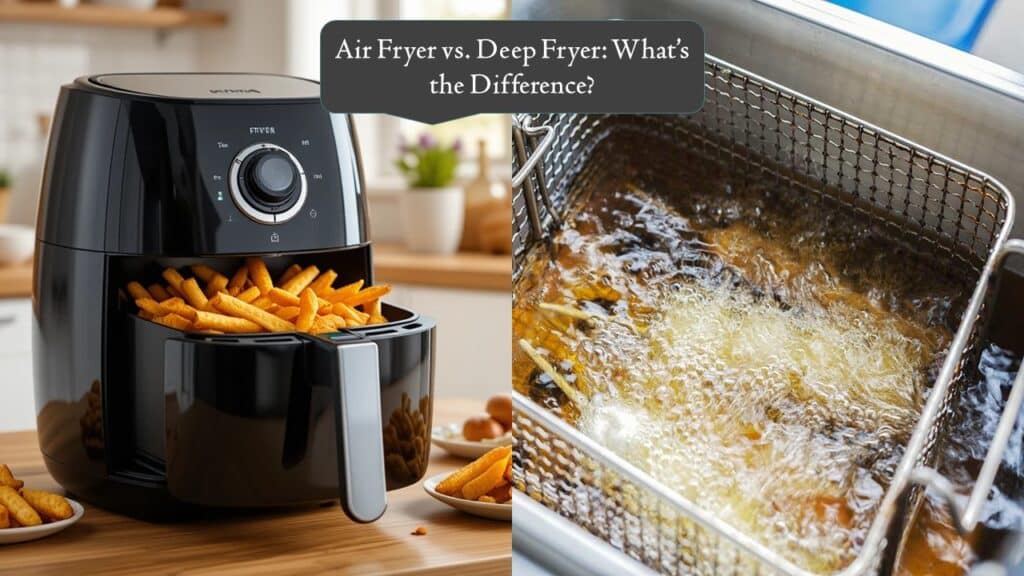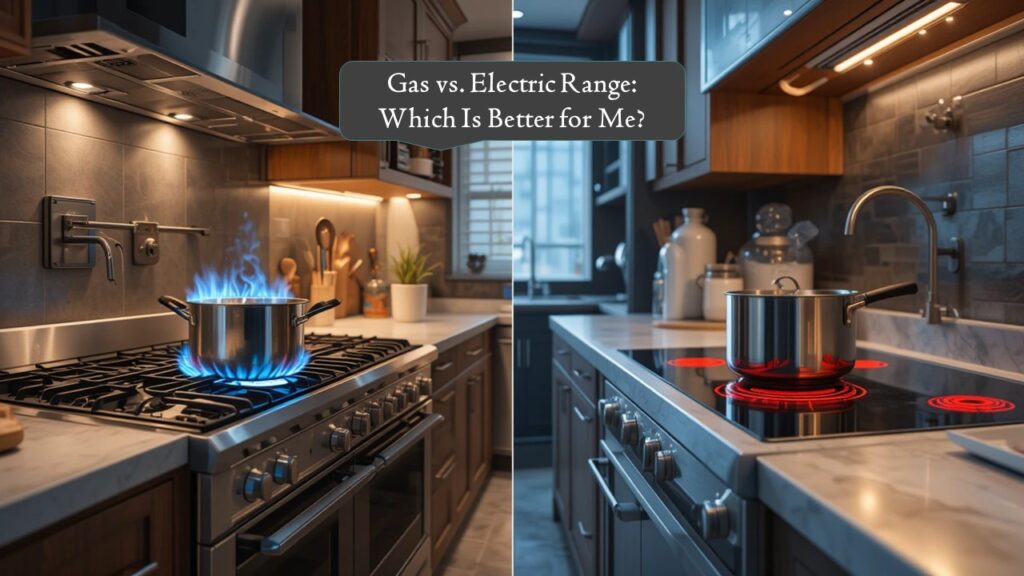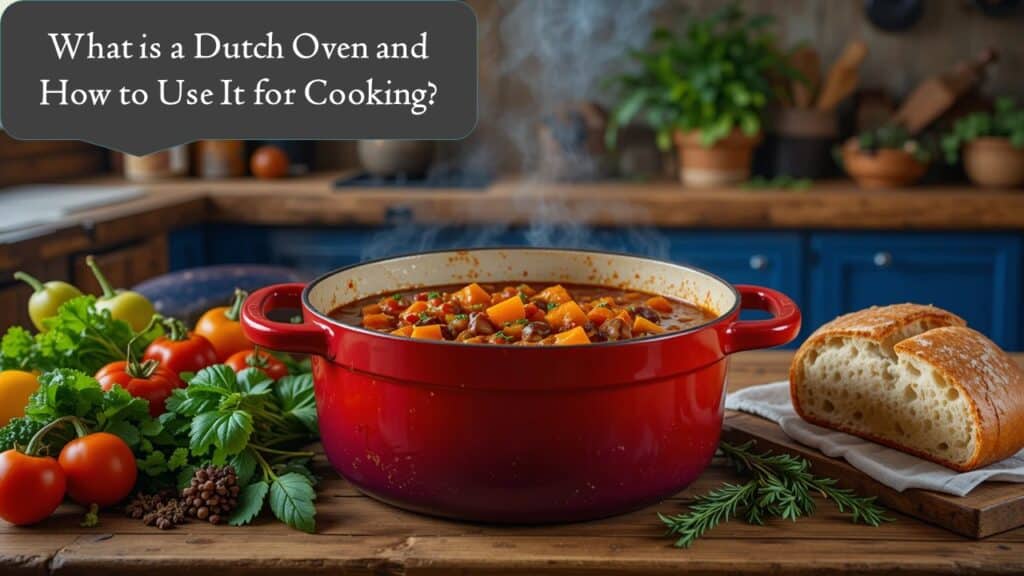Fried foods have a special place in many people’s hearts. Whether it’s golden French fries, crispy fried chicken, or crunchy onion rings, fried dishes bring comfort and satisfaction. Traditionally, deep fryers have been the go-to appliance for achieving that crispy texture. However, with the rise of health-conscious cooking trends, air fryers have gained massive popularity as a healthier alternative.
If you’re torn between buying an air fryer or a deep fryer, this detailed guide will help you understand the differences in cooking methods, health benefits, flavor, convenience, and cost. Let’s break it down so you can choose the best one for your kitchen.
-
Cooking Method: How They Work
Air Fryer
An air fryer is essentially a compact convection oven. It cooks food by circulating hot air around it at high speeds, producing a crispy exterior similar to frying—but with little to no oil. Air fryers use a heating element and a fan to distribute heat evenly, so your food cooks thoroughly without being submerged in oil.
- Cooking temperature: Usually ranges from 300°F to 400°F.
- Oil usage: Requires only a light spray or 1–2 teaspoons of oil.
- Key technique: Rapid air circulation for a crispy texture.
Deep Fryer
A deep fryer cooks food by immersing it completely in hot oil. The oil’s high temperature quickly seals the food’s exterior, creating a crunchy, golden crust while locking in moisture.
- Cooking temperature: Typically 325°F to 375°F.
- Oil usage: Requires cups to quarts of oil to submerge food.
- Key technique: Oil immersion for deep, even frying.
Verdict: Air fryers are a more modern, oil-free cooking method, while deep fryers stick to traditional techniques for maximum crispiness and flavor.
-
Health Comparison
Health is one of the biggest factors influencing the shift toward air fryers.
- Air Fryer Health Benefits:
Air fryers use up to 80–90% less oil than deep fryers, making meals significantly lower in calories and fat. For example, one serving of French fries from an air fryer can contain less than half the fat of deep-fried fries.
They’re also safer because there’s no large vat of hot oil, reducing the risk of burns. - Deep Fryer Health Impact:
Deep-fried foods are higher in fat and calories. The oil used in deep frying can also degrade after repeated use, potentially creating harmful compounds if not handled properly.
Winner: Air fryer, for health-conscious individuals who want to enjoy crispy food without excessive oil.
-
Taste and Texture
When it comes to flavor, deep fryers still have the upper hand.
- Air Fryer Results:
Air-fried foods are crispy, but the texture is slightly different—more like oven-baked food. While air fryers deliver excellent crunch for vegetables, chicken wings, or fries, they may not achieve the same rich flavor and texture as deep frying because there’s less oil absorption. - Deep Fryer Results:
Deep fryers are unbeatable for flavor and texture. The oil penetrates food, creating a crunchy exterior and juicy interior that’s hard to replicate. If you crave that authentic “restaurant-style” fried food, deep frying is the way to go.
Winner: Deep fryer, if authentic taste and texture are your priority.
-
Versatility
- Air Fryer:
Air fryers are incredibly versatile. Besides frying, you can bake, roast, reheat, and grill in them. This makes air fryers a multifunctional appliance perfect for small kitchens or anyone who wants more cooking options without clutter. - Deep Fryer:
Deep fryers are specialized appliances. They’re designed to fry, and that’s pretty much all they do. However, they excel at that one job, making them ideal for those who frequently prepare fried dishes for family gatherings or parties.
Winner: Air fryer, for versatility.
-
Cooking Time
- Air Fryer:
Air fryers generally cook food faster than conventional ovens, but they can take slightly longer than deep fryers because there’s no oil immersion. For example, chicken wings may take 20–25 minutes in an air fryer versus 10–12 minutes in a deep fryer. - Deep Fryer:
Deep frying is faster because the food is completely submerged in hot oil. This method ensures quick, even cooking, which is why restaurants often prefer deep fryers for speed.
Winner: Deep fryer, for speed.
-
Ease of Use and Maintenance
- Air Fryer:
Air fryers are generally easy to use, with preset cooking modes and timers. Cleaning is also simple since most baskets are non-stick and dishwasher-safe. There’s no need to deal with large amounts of leftover oil. - Deep Fryer:
Cleaning a deep fryer can be messy. You’ll need to filter, store, or dispose of used oil safely, which is time-consuming. The fryer itself also requires more scrubbing to remove oil residue.
Winner: Air fryer, for convenience and low maintenance.
-
Safety
- Air Fryer:
Safer for home use because there’s no large pot of boiling oil. There’s less risk of burns or oil splatters, and most models have auto shut-off features. - Deep Fryer:
Hot oil poses safety hazards. If not handled carefully, splashes and spills can cause severe burns. Proper ventilation is also necessary to manage smoke and lingering odors.
Winner: Air fryer, for safety.
-
Cost
- Air Fryer:
Air fryers typically range from $70 to $200, depending on size and brand. Since they use minimal oil, there are no recurring oil costs, making them economical in the long run. - Deep Fryer:
Deep fryers can cost between $50 and $150, but they require large quantities of oil for every use, which adds up over time.
Winner: Air fryer, for cost-effectiveness over time.
-
Space Consideration
Both appliances are relatively compact, but air fryers often take up less counter space than deep fryers and don’t need space for storing large amounts of oil. If you live in a small apartment or dorm, an air fryer is the better fit.
-
Which One Should You Choose?
Choosing between an air fryer and a deep fryer ultimately depends on your lifestyle, taste preferences, and cooking habits:
- Pick an Air Fryer if:
- You want to eat healthier and reduce oil consumption.
- You prefer an appliance that can bake, roast, and reheat in addition to frying.
- You prioritize safety, easy cleaning, and minimal mess.
- Pick a Deep Fryer if:
- You crave that authentic deep-fried flavor and restaurant-quality crispiness.
- You often cook large batches of fried food for gatherings or parties.
- You don’t mind dealing with oil storage and cleanup.
Final Thoughts:
Both appliances have their pros and cons, and neither is a clear winner for everyone. An air fryer is perfect for health-conscious individuals or those who want a multifunctional, low-maintenance appliance. A deep fryer, on the other hand, is the ultimate choice for traditional frying enthusiasts who prioritize taste over everything else.
If your budget and space allow, having both appliances can give you the best of both worlds: a deep fryer for indulgent weekend treats and an air fryer for everyday healthy meals.







